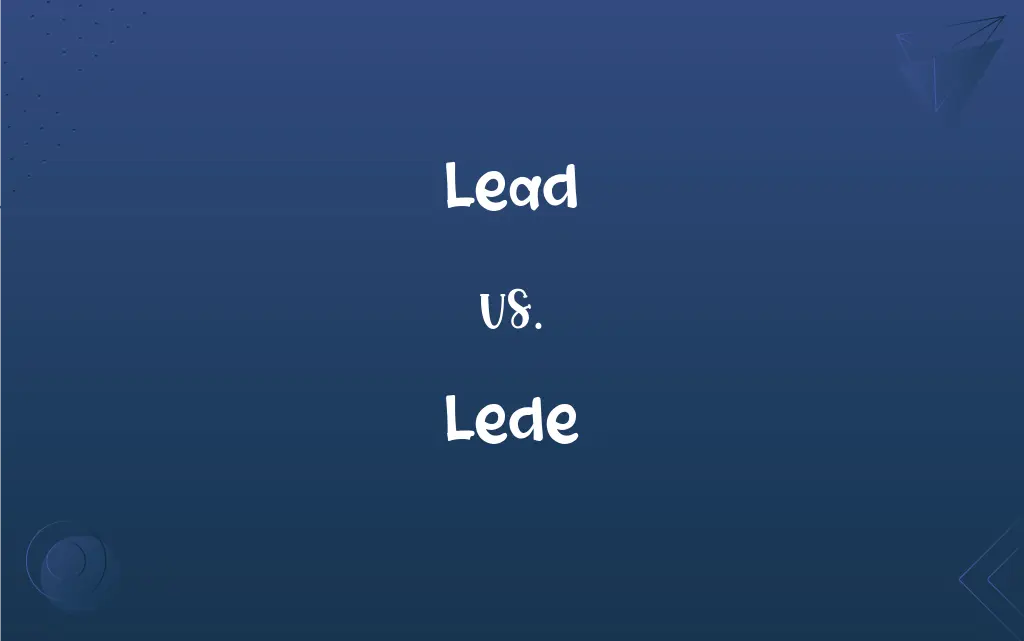Lead vs. Lede: What's the Difference?
Edited by Aimie Carlson || By Harlon Moss || Updated on October 26, 2023
Lead is a soft, heavy metal or the main role, while lede is the introductory part of a news article.

Key Differences
Lead, a noun or verb, is multifaceted. As a noun, it denotes a heavy, malleable metal. As a verb, it means to guide or direct. Lede, on the other hand, is a journalistic term, referring specifically to the introductory portion of a news article or story.
Lead can refer to the principal position in a field. For instance, a leading actor in a movie holds the central role. Lede maintains its journalistic focus, encapsulating the essence of the story, aiming to hook the reader’s attention.
In contexts outside journalism, lead could denote a leash or a clue in an investigation. Lede remains confined to its journalistic use, providing a snapshot of the article's content, setting the tone for the reader.
Lead, when used as a verb, signifies an act of guidance, like leading a group. As a noun, it can refer to an electrical conductor. Lede, in contrast, never deviates from its journalistic meaning, always pointing to the introductory, often crucial, part of a news story.
Comparison Chart
Primary Meaning
A heavy metal; to guide or take charge.
The opening sentence or paragraph of a news article.
ADVERTISEMENT
Usage Context
General, scientific, or leadership roles.
Strictly journalistic.
Part of Speech
Noun and verb.
Noun.
Synonyms
Guide, direct, forefront, element (Pb).
Introduction, opening, preamble.
Associated Industries
Manufacturing, construction, film, leadership.
Journalism, news reporting.
Lead and Lede Definitions
Lead
To guide or direct.
She will lead the team in the next project.
ADVERTISEMENT
Lede
The introductory portion designed to entice readers.
Her lede was so compelling that readers couldn't stop reading.
Lead
The main role in a performance.
He landed the lead role in the Broadway play.
Lede
A summary of the most important points of a news story.
The lede succinctly presented the key facts of the event.
Lead
A position at the front.
The racer maintained a strong lead throughout the race.
Lede
The opening sentence or paragraph of a news article.
The lede of the article immediately caught my attention.
Lead
An initiating clue or piece of information.
The detective followed the lead to solve the mystery.
Lede
A journalistic tool to set the story’s tone.
The journalist crafted a humorous lede for the light-hearted piece.
Lead
To show the way to by going in advance
The host led us to our table.
Lede
An essential element in news writing to engage the audience.
A well-written lede is crucial for capturing the reader's interest.
Lead
A soft, heavy, gray metal (Pb).
Lead pipes were commonly used in older plumbing systems.
Lede
The introductory portion of a news story, especially the first sentence.
Lede
(obsolete) A man; a person.
Lede
The introductory paragraph or paragraphs of a newspaper, or a news or other type of article; the lead or lead-in.
Lede
Obsolete spelling of lead
FAQs
Is lede used outside of journalism?
No, lede is specifically a journalistic term.
What does lede mean?
Lede is the introductory part of a news article.
Can lead be a verb?
Yes, it can mean to guide or direct.
Can lead refer to a position?
Yes, it can refer to a leading or front position.
Is lede ever a verb?
No, lede is always used as a noun.
What’s an example of lead in a sentence?
"He took the lead in the project."
Are there different spellings for lead?
Yes, but it depends on the context (lead as a metal, or lead as in leadership).
Are there different spellings for lede?
No, lede is specifically spelled that way in journalistic contexts.
What industries use the term lead?
Industries like manufacturing, construction, film, and leadership.
Can lead be related to a clue?
Yes, it can refer to an initiating clue or piece of information.
Does lede have synonyms?
Yes, synonyms include introduction, opening, or preamble.
What industries use the term lede?
Primarily the journalism and news reporting industry.
Does lede ever relate to clues?
No, lede is strictly about the start of a news story.
Does lede have any scientific meaning?
No, lede doesn’t have a scientific context.
Can lead be a noun?
Yes, it can be a noun or verb.
How does lede capture attention?
By summarizing key points and setting the story’s tone.
What is lead?
Lead is a soft, heavy metal, or it can refer to being in charge or the main role.
Is lead used outside of journalism?
Yes, lead has multiple uses in various contexts, including as a metal and in leadership roles.
What’s an example of lede in a sentence?
"The article's lede was intriguing."
Is lead related to electricity?
Yes, it can refer to an electrical conductor.
About Author
Written by
Harlon MossHarlon is a seasoned quality moderator and accomplished content writer for Difference Wiki. An alumnus of the prestigious University of California, he earned his degree in Computer Science. Leveraging his academic background, Harlon brings a meticulous and informed perspective to his work, ensuring content accuracy and excellence.
Edited by
Aimie CarlsonAimie Carlson, holding a master's degree in English literature, is a fervent English language enthusiast. She lends her writing talents to Difference Wiki, a prominent website that specializes in comparisons, offering readers insightful analyses that both captivate and inform.































































